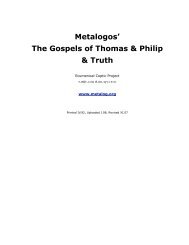Andrew Louth - Syriac Christian Church
Andrew Louth - Syriac Christian Church
Andrew Louth - Syriac Christian Church
You also want an ePaper? Increase the reach of your titles
YUMPU automatically turns print PDFs into web optimized ePapers that Google loves.
164 TEXTS<br />
C<br />
D<br />
1413A<br />
—we dare to take the Word before us and say that the play of<br />
God spoken of by the great teacher is a kind of keeping to the<br />
middle, staying equidistant from the extremes, by weaving<br />
about and quickly changing one’s position, or, to put it better,<br />
by a flowing that remains still. And this is the paradox: to<br />
behold stillness eternally flowing and being carried away, a<br />
flowing, eternally-moving, divinely contrived to contribute<br />
providentially to the improvement of the whole divine<br />
economy, capable of making wise those who are taught by it to<br />
hope always for change, and to believe that the end of this<br />
mystery for them is that by an inclination towards God they<br />
might be securely deified by grace. By the middle I mean the<br />
totality of things visible which now surround the human being<br />
or in which the human is; by the extremes I mean the reality of<br />
everything not manifest and which is going unfailingly to<br />
surround humanity, things that have properly and truly been<br />
made and come into being in accordance with the ineffable and<br />
preeminent purpose and reason of the divine goodness. 7 Just<br />
as the wise Preacher with the great and clear eye of the soul<br />
caught a glimpse of the coming into being of visible and<br />
flowing things and, as in a vision, of their being made and<br />
coming into being, and said, What is this that has been? It is the<br />
same as that which is going to be. And what is this that has<br />
been made? It is the same as that which is going to be made<br />
(Eccles. 1:9). Clearly he has in mind the first and the last<br />
things, as those which are themselves and truly are, and also<br />
the middle things, that pass away and are never in the same<br />
place. For when the teacher has come to an end of speaking<br />
grandiosely of a certain kind of living things and of stones, and<br />
of simply speaking boundlessly of the many things that can<br />
been seen in beings, 8 he adds ‘The high Word plays in every<br />
kind of form, mixing, as he wills, with his world here and<br />
there.’ Is it not therefore the same as what he says in his<br />
sermon on Holy Pentecost about divinity and created nature?<br />
‘As long as each nature remains on its own, the one in its<br />
majesty, the other in its lowliness, his goodness remains<br />
unmixed and his love for human kind unshared, and there is a<br />
great gulf in the middle that cannot be crossed, which not only<br />
separates the rich man from Lazarus and the longed-for bosom<br />
of Abraham, 9 but also every nature that has come to be and is<br />
in a state of flux from that nature which has not come to be<br />
and is immutable.’ 10 Somewhat similar to this is what the<br />
great divine preacher Denys the Areopagite says: ‘We must<br />
dare to add this as being no less true: that the source of all




